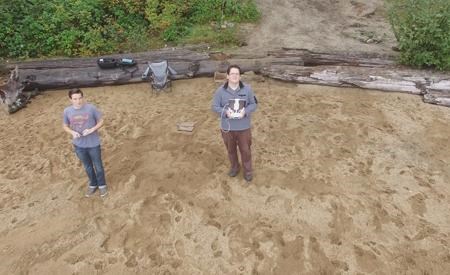Concerns are mounting in Powell River as the number of model airplanes and drones taking to the skies continues to rise.
City of Powell River councillor Russell Brewer told the committee of the whole on October 13 he was planning to speak on the issue and the city had also received complaints about radio-controlled planes being flown near of École Côte du Soleil.
“We have been forced to live in fear of radio-controlled airplanes flying over our house,” wrote Neil Woloschuk in the letter signed by 10 other residents who live near Duncan Street. “These noisy planes are going from the field all the way to Duncan Street and back. They are crossing over two roads, over many houses, a school, a gas station and the vicinity of city hall and the public library.”
Complaints have been lodged with Powell River RCMP and the city’s bylaw enforcement officers, but Woloschuk added he and others in the neighbourhood are concerned not enough is being done to prevent a crash or deal with noise from the aircraft.
The city does not currently have a bylaw that deals specifically with the devices, but Canada does have federal laws that govern the operation of radio-controlled aircraft and unmanned air-vehicle systems, often referred to as drones.
Transport Canada has also released information on general safety practices for use, which stipulate aircraft not be flown at altitudes higher than 90 meters (300 feet), over roads, near airports or residential neighbourhoods, among other restrictions.
“I don’t think it’s a bad idea for the city to have a bylaw for model airplanes,” said mayor Dave Formosa. “Maybe there is somewhere in the community where we can safely allow it. It would be terrible if there was nowhere that people could fly these things.”
Formosa added he could see why the planes flying around Westview would cause a problem and a bylaw might give the RCMP more ability to handle complaints.
Pacific Community Networks Association technical manager Danny McKenzie, who teaches youth how to operate drones safely, said that much of what other cities are trying to do with bylaws is already covered by federal regulations.
“There’s already rules in place and it’s more the case that cities are trying to make people realize them,” said McKenzie. “It’s people who don’t know the rules who are causing problems.”
RCMP sergeant Kevin Day said that police respond to after-hours noise complaints, but a bylaw would give police more ability to address resident concerns.
“If police did get involved we would have a long discussion [with the operators] and look at alternatives and other ways they could use it to also try to respect the peace of property owners,” said Day.
Day added that if federal transportation laws were being violated the RCMP could start an investigation and hand it off to Transportation Safety Board of Canada.
After discussion among councillors on October 13, the committee of the whole agreed that it would work to raise awareness on the issue and talk with residents who wish to express their views.
Councillor Jim Palm told the committee that he thought it was a good idea that the city approaches the issue similarly to how it handled longboard skateboarding, which brought youth together with city officials and police to talk about the safety issues.
The city did pass a bylaw to regulate longboards, but it was to be used only if discussions failed to remedy the situation.
“It’s important to raise awareness on the issue [of drones and model planes],” said Brewer, “before something happens.”



